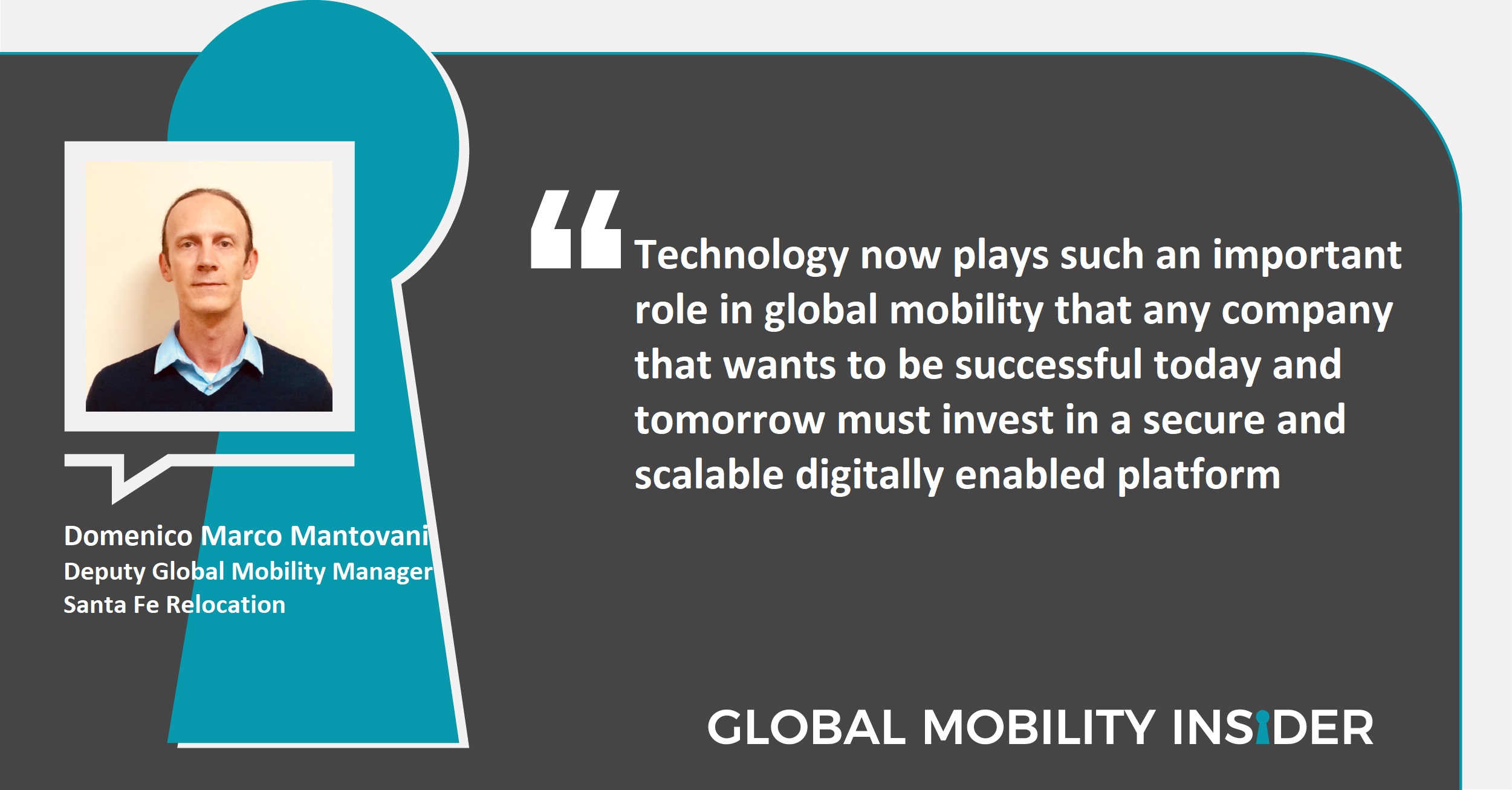Domenico Marco Mantovani - Deputy Global Mobility Manager - Santa Fe Relocation
Name: Domenico Marco Mantovani
Position: Deputy Global Mobility Manager
Company: Santa Fe Relocation

Professional Background
Santa Fe Relocation, Deputy Global Mobility Manager (United Kingdom): 2016 – Present
Santa Fe Relocation, Senior Global Mobility Consultant (United Kingdom): 2009 – 2016
Relocation Enterprises, Senior Relocation Coordinator (Italy): 2006 – 2009
Ciceri & Boneschi Associate, Para Legal Assistant (Italy): 2005 – 2006
Career Insider
Q: Has your own experience as an expat contributed to your work at Santa Fe?
A: Yes. I lived in Sweden for a while and I have been in the UK for a long period of time now, so I consider myself an ‘honorary Brit’. I have tried to use my initial experiences in the UK to help others settle and integrate themselves into British life like I had to. Everyday challenges in a different country such as bureaucracy, cultural barriers and language can easily put you off.
Click & Like on LinkedIn
Q: What at Santa Fe keeps you going to work every day?
A: I enjoy the multiple different scenarios that global mobility throws up and ultimately, I enjoy helping people. At Santa Fe there is always someone willing to help you out if you have a question or a difficult situation. At the same time my colleagues at the same level are friendly and always trying to help out.
Q: What advice would you give to someone looking to build a career in global mobility?
A: Don’t be concerned if you come into the profession with limited knowledge or what seems like limited knowledge compared to your colleagues. There is always so much to learn in this area that you can never know it all – even if some people claim they do. Just knuckle down and keep learning. Then you won’t go far wrong.
Industry Insider
Q: What aspect of global mobility is likely to keep you up at night?
A: Immigration compliance! I deal with a number of ‘difficult’ countries in this regard! In some regions you go to bed with one set of regulations and the next day you wake up and they been changed!
Q: What is the most important strategic tip you can give to companies handling global mobility?
A: As an industry we need to promote diversity! Sometimes it feels like STEM (science, technology, engineering and maths) are far too male dominated for the 21st century. According to Santa Fe Relocation’s recent Global Mobility Survey 2018, more than 600 corporate human resources and global mobility participants reported that their international mobility ratio is 75% men and 25% women. Unless this is addressed, many companies are missing out on a vast talent pool that remains untapped!
Q: What kind of tech or software would you suggest for global mobility processing?
A: Technology now plays such an important role in global mobility that any company that wants to be successful today and tomorrow must invest in a secure and scalable digitally enabled platform. Here at Santa Fe we are leveraging a Salesforce platform that really puts us at the forefront of the digital world and in a position to deliver our customer and internal user needs.
Visionary Insider
Q: How can global mobility professionals ensure that they are handling issues of diversity and inclusion appropriately?
A: I would say fully accepting the basic notion that diversity and inclusion are not only morally correct, but good for the business. A 2017 research paper from Harvard Business Review reports that diverse teams perform better and provide higher returns for employers. This is a deeper talent challenge that executive boards need to embrace and take more personal accountability for to ensure there are no glass ceilings or biases. Look at the gender distribution on the executive boards of many Fortune 500 companies – there is still a long journey ahead.
Overall, I think the whole industry has made big steps in the matter but the final goal is still far. Do not bury yourself under endless pages of regulations but try to focus on the individuals. With a closer collaboration between the human resources hiring and talent, the global mobility teams would improve the situation.
Q: How can global mobility practices get better in the next 5 years?
A: Immigration as an area isn’t considered as much as it should be. Often a job is offered to the candidate without checking if he/she will able to get a visa and if his/her partner will be able to join them (for example, some countries do not recognize same sex marriage). Human capital was, and will be, one the most important aspect of the future. Furthermore, the introduction of the General Data Protection Regulation (GDPR) on the 25th May 2018, has also required companies and their supply-chains to ensure that data is handled even more appropriately. So, if an immigration application is rejected (as above), the line manager may not be aware of the situation. Managing the communication that the application has been rejected will therefore require careful handling and clear operating protocols.
Q: What more can be done to improve current global mobility practices to benefit talents on the move?
A: Expat families need to be accompanied when they first move into their new environment and we need to offer them as much assistance as possible. We are far too focused on the now, rather than the future. The repatriation needs to be more widely implemented and more support needs to be offered here as well. Organisations’ policies need to be regularly reviewed to ensure they reflect their employees’ demographic and generational requirements – as I mentioned earlier, diversity will challenge the notion of a ‘traditional family’.
Q: What are the major developments you currently see happening in the industry, and how do you feel about them?
A: Technology is changing the way global mobility is managed operationally. In the last few years Santa Fe has significantly invested in a new software and we are seeing the good results of that! Data analytics, for example: performance, talent, costs, demographics will increasingly be the tools that corporate HR and executives will demand to create competitive advantage.
This means that global mobility providers will need to be able to deliver not only quality relocation and assignment services but also be able to deliver effective reporting and advisory support. There is an explicit assumption that the industry can deliver immigration, relocation and destination services, but increasingly will expect global organisations like Santa Fe Relocation to be their global mobility partner, not just a ‘vendor’. That means, to remain sustainable, we will have to offer a combination of professional service support and on-the-ground teams around the world, delivering the physical relocation services.
Either/Or…
- Short-term or long-term assignment? Short term, more challenging.
- Airbnb or serviced apartments? Serviced apartments, but companies should consider Airbnb for the flexibility and appeal to the younger generation.
- Excel or global mobility software? Global mobility software
- Lump-sum or flex-ben? Flex-ben
- Facebook or LinkedIn? LinkedIn
- Outlook or Gmail? Outlook
- Taxi or Uber? Uber but nothing can replace a chat with a Belfast Taxi driver!
- iOS or Android? iOS
- Mac or PC? Mac for personal, PC for work.
- Computer or tablet? Both
- Work hard or play hard? Work hard and play cricket! Go Warwickshire!


Leave a Comment
* Fields marked with this asterisk are mandatory.